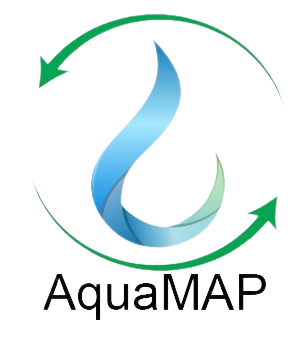
Global Water Challenge
Stockholm Junior Water Prize India
.
The Stockholm Junior Water Prize (SJWP) in India is an esteemed competition that provides a platform for young minds to showcase their innovative solutions and ideas in the field of water conservation and sustainability This prestigious event is a part of the international Stockholm Junior Water Prize, which was first introduced in 1997 by the Stockholm International Water Institute (SIWI). The competition aims to engage and inspire the next generation of water professionals, encouraging them to tackle pressing water-related challenges through research, creativity, and scientific inquiry.
AquaMAP has been proudly sponsoring the Stockholm Junior Water Prize (SJWP) India edition since its inception, supporting young innovators in addressing water challenges through science and technology

AquaMAP – Centre for Water Management and Policy at IIT Madras was established in 2022 with the vision of leveraging cutting-edge research and technology to solve India’s pressing water challenges. Initiated with seed funding from IIT Madras alumni donors Dr. Parasuram Balasubramanian and Mr. Krishnan Narayanan, AquaMAP was born out of an IIT alumni-led vision to translate innovative technologies and best practices into scalable, real-world solutions. By bridging academic research with field-level implementation, AquaMAP brings together the expertise of IITM faculty, alumni, industry, government, and NGOs to drive sustainable and impactful water management practices across the country.
Shortlisted Teams
Stockholm Junior Water Prize India 2.0
Gauri Gupta & Ryan Wazz
Neerja Modi School, Jaipur, Rajasthan
Samanyu Srivastav
Delhi Public School, Delhi, New Delhi
Deekshitha R
Vanshi Manthan Vidyashram, Chennai, Tamil Nadu
Yazhisan
Sri Sankara Vidyalayaa Senior Secondary School, Karur, Tamil Nadu
Aadya Kanchan
Vidyashilp Academy, Bengaluru, Karnataka
Veer Amit Mehta
Dhirubhai Ambani International School, Mumbai, Maharashtra
Krishanth Abhinav . M
Amalorpavam Lourds academy, Puducherry, Puducherry
M.Nithishkumar
Montfort Matric Hr Sec
School Ariyalurm, Chennai, Tamil Nadu
Kamalrajan.R
Thamarai International School,
Tanjore, Tamil Nadu
Aryaman Agarwal
Aditya Birla World Academy,
Mumbai, Maharastra
Aditya Chaudhary
Shaheed Rajpal DAV Public School, Delhi, Delhi
Dev Karan & Yash Triparthi
Delhi Public School, Noida, Uttar Pradesh
Daksh Gandhi
Suncity School, Gurgaon, Haryana
Nikhil Lemos
Navrachana Higher Secondary School, Vadodara, Gujarat
Siya Singh
The Shriram Millennium School, Noida
Dhawin Senthilmurugan
Sarala Birla Gyan Jyoti, Guwahati, Assam
Sara Garg & Veertejas Singh Baja
Shiv Nadar School, Noida, Uttar Pradesh
Harshveer singh
BCM Arya Model Sen. Sec. School,
Ludhiyana Punjab
Shreyas Aggasare & Nakshathra Sureshbabu
DPS Electronic City,
Bangalore, Karnataka
Piyush Pitre
Abhinav English School,
Pune, Maharastra
Congratulations
Finalist for the National Water Champion title
Samanyu Srivastav
Delhi Public School R. K. Puram, Delhi, New Delhi
Eligibility
The Stockholm Junior Water Prize in India is open to school students grades 9th to 12th and should have completed 15 years who are passionate about water-related issues and eager to contribute innovative solutions to challenges in the field. Students may enter as individuals or in groups of two. Eligible participants can be enrolled in secondary or higher secondary educational institutions and should not be enrolled in a university.

In India, the SJWP competition is a vital initiative to foster a sense of environmental responsibility among young individuals. Participants, typically between the ages of 15 to 20, are invited to submit projects that address various water-related issues, such as water quality, sanitation, and access to clean water. The competition not only provides a platform for students to showcase their projects but also offers an opportunity for them to connect with like-minded individuals, mentors, and professionals in the water sector. Through the SJWP, participants gain valuable insights into the complexities of water management while contributing to the global dialogue on sustainable water practices.
The Stockholm Junior Water Prize in India plays a crucial role in nurturing the passion and talents of young scientists, engineers, and innovators. By recognizing and celebrating their efforts, the competition not only empowers the youth to positively impact their communities but also contributes to building a sustainable and water-secure future for the nation and the world. Through the SJWP, India continues to cultivate a new generation of water champions who are dedicated to finding innovative solutions to the water challenges that our planet faces today and in the years to come.
Guidelines
The number of pages for the application is limited to 22. The common guidelines for preparing the application are as follows:
- Project Relevance: Ensure that your project addresses a significant water-related issue, such as water quality, conservation, sanitation, or access to clean water. Clearly articulate the problem you are addressing and explain the relevance of your project to real-world challenges.
- Scientific Rigour: Emphasise the scientific methodology and rigour of your research. Provide a detailed explanation of your experimental design, data collection methods, and analysis. Demonstrate the scientific principles behind your project and how they contribute to solving the identified water-related problem.
- Innovation and Creativity: Showcase the uniqueness and creativity of your project. Highlight any innovative solutions, technologies, or approaches that set your work apart from conventional methods. Illustrate how your project brings a fresh perspective or introduces novel ideas to address the water challenge.
- Clear Presentation: Present your findings and conclusions. Use concise and well-organised language, charts, graphs, and visuals to convey your project’s key aspects. Ensure that your application is easy to understand for both experts and non-experts in the field.
- Practical Applications: Discuss the practical applications of your project and its potential impact. Articulate how your findings could be implemented in real-world scenarios, emphasising the sustainability and feasibility of your proposed solutions.
- References and Citations: Provide proper references and citations for any external sources or previous research that influenced your project. This demonstrates the depth of your research and places your work within the broader context of existing knowledge.
- Project Documentation: Ensure that all aspects of your project, including research notes, data, and relevant materials, are thoroughly documented. This documentation should support the validity and reproducibility of your work.
Deadline
The application will be open till 25th March 2025.
Source – United Nations Water


